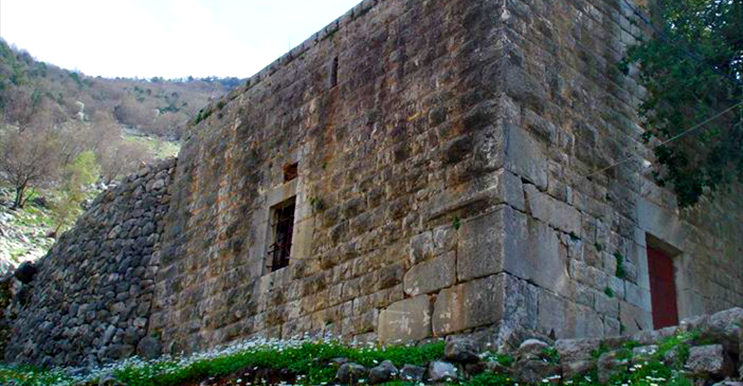
The 7
Surrounding Villages
Jabal Moussa is surrounded by 7 main villages: Yahchouch, Qehmez, Jouret el Thermos, Nahr ed Dahab, Ghbale, Aabri, and Chouwan.
-
Al iibré and Chouwan
Governorate: Mount Lebanon
Caza: Ftouh Kesserwan
Altitudes: 200m to 1,150m
Distance from Beirut: 45 Km
Meaning and origins of the village name:
1st possibility: Distortion of the word “hāshūsha”, meaning the agonized and tortured. 2nd possibility: Present form of the verb “hashsh”, meaning suffered and endured. 3rd possibility: Village of pain and agony. 4th possibility: Syriac word meaning the “Suffering god”All four possibilities refer to pain and suffering. To explain this, one must go back thousands of years ago, to the times of the Phoenicians, whose god Adonis dies while hunting in the Valley of Adonis River (Nahr Ibrahim), the river that bounds the village of Yahchouch on the North.
Touristic sites:
Two ancient watermills
Ancient Olive Press
Monastry: Saint Georges (Mar Geryes), inside Jabal Moussa
Church: Saint Simon
Church: Our Lady of Ghochraya
Cross of Yahchouch
One entrance to Jabal Moussa Reserve in Assnawbar, a neighborhood of Yahchouch -
-
Qehmez
Governorate: Mount Lebanon
Caza: Ftouh Kesserwan
Altitudes: 200m to 1,150m
Distance from Beirut: 45 Km
Meaning and origins of the village name:
1st possibility: Distortion of the word “hāshūsha”, meaning the agonized and tortured. 2nd possibility: Present form of the verb “hashsh”, meaning suffered and endured. 3rd possibility: Village of pain and agony. 4th possibility: Syriac word meaning the “Suffering god”All four possibilities refer to pain and suffering. To explain this, one must go back thousands of years ago, to the times of the Phoenicians, whose god Adonis dies while hunting in the Valley of Adonis River (Nahr Ibrahim), the river that bounds the village of Yahchouch on the North.
Touristic sites:
Two ancient watermills
Ancient Olive Press
Monastry: Saint Georges (Mar Geryes), inside Jabal Moussa
Church: Saint Simon
Church: Our Lady of Ghochraya
Cross of Yahchouch
One entrance to Jabal Moussa Reserve in Assnawbar, a neighborhood of Yahchouch -
-
Nahr ed Dahab
Governorate: Mount Lebanon
Caza: Ftouh Kesserwan
Altitudes: 200m to 1,150m
Distance from Beirut: 45 Km
Meaning and origins of the village name:
1st possibility: Distortion of the word “hāshūsha”, meaning the agonized and tortured. 2nd possibility: Present form of the verb “hashsh”, meaning suffered and endured. 3rd possibility: Village of pain and agony. 4th possibility: Syriac word meaning the “Suffering god”All four possibilities refer to pain and suffering. To explain this, one must go back thousands of years ago, to the times of the Phoenicians, whose god Adonis dies while hunting in the Valley of Adonis River (Nahr Ibrahim), the river that bounds the village of Yahchouch on the North.
Touristic sites:
Two ancient watermills
Ancient Olive Press
Monastry: Saint Georges (Mar Geryes), inside Jabal Moussa
Church: Saint Simon
Church: Our Lady of Ghochraya
Cross of Yahchouch
One entrance to Jabal Moussa Reserve in Assnawbar, a neighborhood of Yahchouch -
-
Ghbaleh
Governorate: Mount Lebanon
Caza: Ftouh Kesserwan
Altitudes: 200m to 1,150m
Distance from Beirut: 45 Km
Meaning and origins of the village name:
1st possibility: Distortion of the word “hāshūsha”, meaning the agonized and tortured. 2nd possibility: Present form of the verb “hashsh”, meaning suffered and endured. 3rd possibility: Village of pain and agony. 4th possibility: Syriac word meaning the “Suffering god”All four possibilities refer to pain and suffering. To explain this, one must go back thousands of years ago, to the times of the Phoenicians, whose god Adonis dies while hunting in the Valley of Adonis River (Nahr Ibrahim), the river that bounds the village of Yahchouch on the North.
Touristic sites:
Two ancient watermills
Ancient Olive Press
Monastry: Saint Georges (Mar Geryes), inside Jabal Moussa
Church: Saint Simon
Church: Our Lady of Ghochraya
Cross of Yahchouch
One entrance to Jabal Moussa Reserve in Assnawbar, a neighborhood of Yahchouch -
-
Jouret El Termos
Governorate: Mount Lebanon
Caza: Ftouh Kesserwan
Altitudes: 200m to 1,150m
Distance from Beirut: 45 Km
Meaning and origins of the village name:
1st possibility: Distortion of the word “hāshūsha”, meaning the agonized and tortured. 2nd possibility: Present form of the verb “hashsh”, meaning suffered and endured. 3rd possibility: Village of pain and agony. 4th possibility: Syriac word meaning the “Suffering god”All four possibilities refer to pain and suffering. To explain this, one must go back thousands of years ago, to the times of the Phoenicians, whose god Adonis dies while hunting in the Valley of Adonis River (Nahr Ibrahim), the river that bounds the village of Yahchouch on the North.
Touristic sites:
Two ancient watermills
Ancient Olive Press
Monastry: Saint Georges (Mar Geryes), inside Jabal Moussa
Church: Saint Simon
Church: Our Lady of Ghochraya
Cross of Yahchouch
One entrance to Jabal Moussa Reserve in Assnawbar, a neighborhood of Yahchouch -
-
Yahchouch
Governorate: Mount Lebanon
Caza: Ftouh Kesserwan
Altitudes: 200m to 1,150m
Distance from Beirut: 45 Km
Meaning and origins of the village name:
1st possibility: Distortion of the word “hāshūsha”, meaning the agonized and tortured. 2nd possibility: Present form of the verb “hashsh”, meaning suffered and endured. 3rd possibility: Village of pain and agony. 4th possibility: Syriac word meaning the “Suffering god”All four possibilities refer to pain and suffering. To explain this, one must go back thousands of years ago, to the times of the Phoenicians, whose god Adonis dies while hunting in the Valley of Adonis River (Nahr Ibrahim), the river that bounds the village of Yahchouch on the North.
Touristic sites:
Two ancient watermills
Ancient Olive Press
Monastry: Saint Georges (Mar Geryes), inside Jabal Moussa
Church: Saint Simon
Church: Our Lady of Ghochraya
Cross of Yahchouch
One entrance to Jabal Moussa Reserve in Assnawbar, a neighborhood of Yahchouch -



